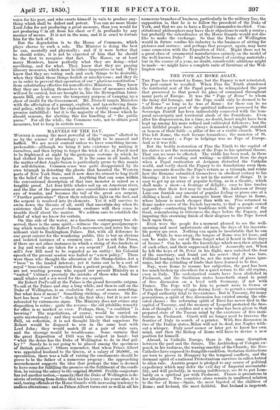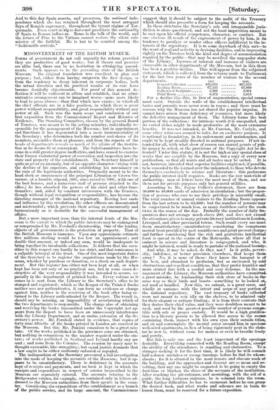THE POPE AT HOME AGAIN.
Tin Pope has returned to Rome, but the Papacy is not reinstated. The past cannot be recalled. When Pius the Ninth abandoned the territorial seat of the Papal power, he relinquished the post that preserved to that power its place of command throughout many parts of Europe. It was the " Pope of Rome" to whom the many did homage, and the Pope could only be deemed to be " of Rome" so long as he was at Rome : for there can be no doubt that a great part of the spiritual influence possessed by the Sovereign Pontiff has been indissolubly connected with the tem- poral sovereignty and territorial abode of the Pontificate. Even after his dispossession, for a time, no doubt, heart might have been kept up among his more refined and cultivated followers ; but the most faithful peoples have always demanded a tangible standard or beacon of their faith—a pillar of fire or a visible church. When Pius left Rome, the rock became tenantless; the mansion of St. Peter was vacant ; a Pope in lodgings was no Pope of Europe. And so it was felt.
But the bodily restoration of Pius the Ninth to the capital of his states is not the restoration of the Pope to his spiritual throne. That can no more be effected. The riddle has been read, in these terrible days of reading and writing—so different from the days when a Papal rustication at Avignon disturbed the Catholic world, and verily shook the Papacy to its foundations even then. Some accounts describe the Pope's return as a triumph, and relate how the Romans submitted themselves in obedient ecstasy to his blessing : it is not true—it is not in the nature of things. It is easy to get up an array of popular feeling, as in a theatre, which shall make a show—a frontage of delight ; easy to hire twelve beggars that their feet may be washed. Mr. Anderson of Drury Lane can furnish any amount of popular feeling or pious awe at a shilling a head ; and the managers know these things in Rome, where labour is much cheaper than with us. Pius returned to Rome under cover of the French bayonets, to find a people cowed and sulky—contrasting their traditions with the presence of the Gaul, remembering in bitterness the days before the Papacy, and imputing this crowning finish of their disgrace to the Pope forced back upon them. Even were the people for a moment pleased to see the well- meaning and most unfortunate old man, the days of his inscruta- ble power are over. Nothing can again be inscrutable that he can hold. While he was away, the tongue of Rome was let loose, and can he make the ear of Rome forget what it heard in those days of licence ? Can he undo the knowledge which men then attained of each other, and their suppressed ideas ? Assuredly not. When he left the keys of St. Peter in his flight, men unlocked the door of the sanctuary, and found out his secret—that it was bare. Political bondage to them will be, not the renewal of pious igno- rance, but the rebinding of limbs that have learned to be free.
Nay, were Rome to resume her subjection, the past has been too much broken up elsewhere for a quiet return to the old regime, even in Italy. The ecclesiastical courts have been abolished in Piedmont, and the Sardinian states henceforth stand in point of free discussion on a level with Germany, if not with France. The Pope will be fain to permit more in Genoa or Turin than the eating of eggs during Lent—to permit a canvassing of Papal authority fatal to its existence. But in Tuscany, for many generations, a spirit of free discussion has existed among the edu- cated classes : the reforming spirit of Ricci has never died in the capital of Tuscany, and the memory of Leopold protected the free.. dom of thought : a sudden and a new value has been given to that prepared state of the Tuscan mind by the existence of free insti- tutions in Piedmont. Giusti will no longer need to traverse the frontier of Italy in search of a printer. With free discussion in two of the Italian states, Milan will not be deaf, nor Naples with- out a whisper. Italy must sooner or later get to know her own mind, and then the Bishop of Rome will have to devise a new position for himself.
Abroad, in Catholic Europe, there is the same disruption between the past and the future. The Archbishop of Cologne ex- posed, in his rashness, the waning sanctity of the Church; the Neo- Catholics have exposed its frangible condition. Sectarian distinctions are torn to pieces in Hungary by the temporal conflicts, and the dormant spirit of a national Protestantism survives in sullen hatred to alien rule. Austria proper is pledged to any course of political expediency which may defer the evil day of Imperial accountabi- lity, and will probably, in waxing indifferency, see fit to put Lon?.• hardy on a spiritual par with Piedmont. France is precarious. in her allegiance. Two countries alone remain in unaltered relation to the See of Rome—Spain, the most bigoted of the children of Rome; and Ireland, the most faithfuL But Ireland is impotent. And to this day Spain asserts, and preserves, the national hide- n.denne which she has retained. throughout the most arrogant days of Romish supremacy, throughout the tyrant regime of Tor- quemada. Even court intrigue dares not prostitute the nationality of Spain to Roman Mum ca. Rome is the talk of the world, and the return of Pius to the Vatican cannot restore the silent sub- mission of the faithfuL He is but to be counted among the " fashionable arrivals."



























 Previous page
Previous page